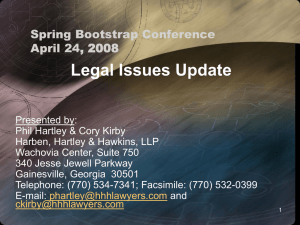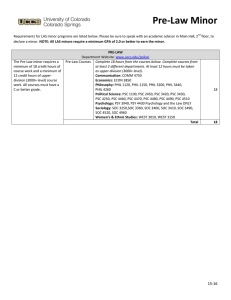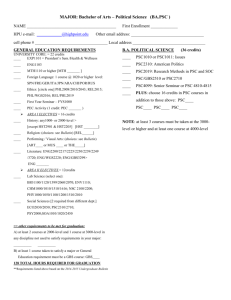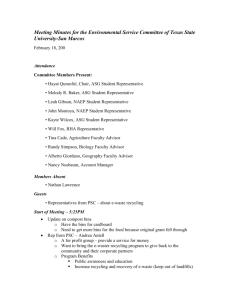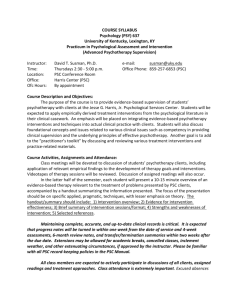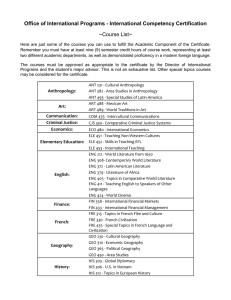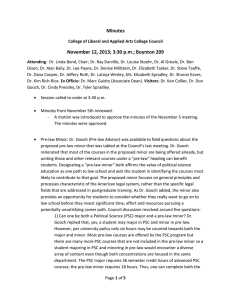Minutes November 5, 2013; 3:30 p.m.; Boynton 209
advertisement
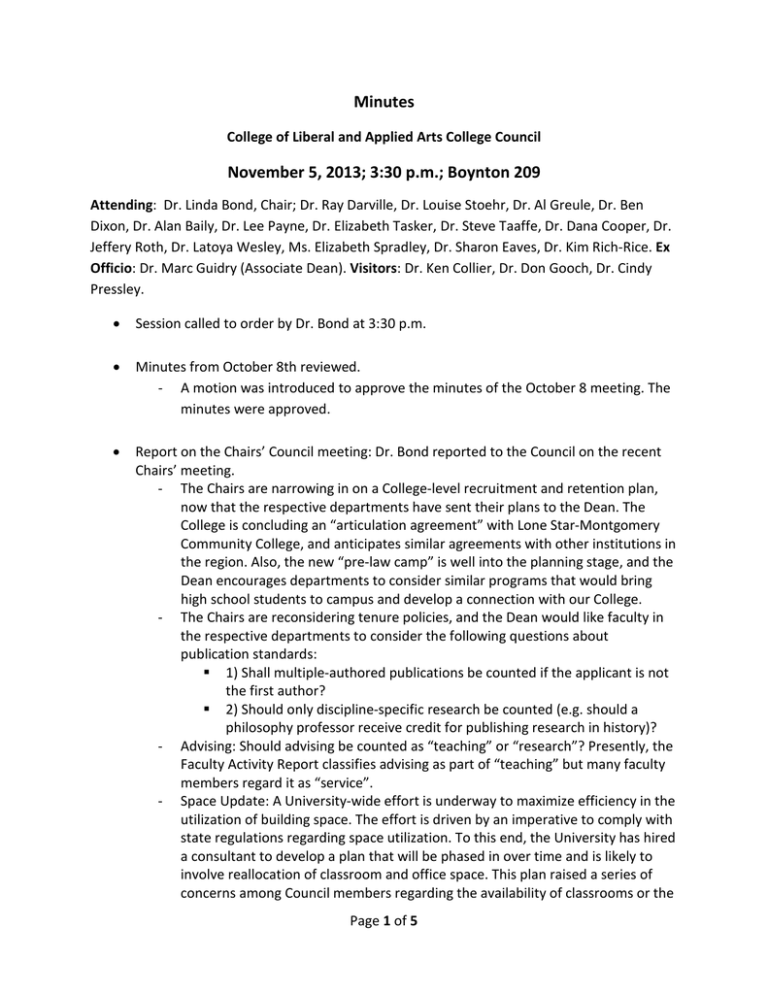
Minutes College of Liberal and Applied Arts College Council November 5, 2013; 3:30 p.m.; Boynton 209 Attending: Dr. Linda Bond, Chair; Dr. Ray Darville, Dr. Louise Stoehr, Dr. Al Greule, Dr. Ben Dixon, Dr. Alan Baily, Dr. Lee Payne, Dr. Elizabeth Tasker, Dr. Steve Taaffe, Dr. Dana Cooper, Dr. Jeffery Roth, Dr. Latoya Wesley, Ms. Elizabeth Spradley, Dr. Sharon Eaves, Dr. Kim Rich-Rice. Ex Officio: Dr. Marc Guidry (Associate Dean). Visitors: Dr. Ken Collier, Dr. Don Gooch, Dr. Cindy Pressley. • Session called to order by Dr. Bond at 3:30 p.m. • Minutes from October 8th reviewed. - A motion was introduced to approve the minutes of the October 8 meeting. The minutes were approved. • Report on the Chairs’ Council meeting: Dr. Bond reported to the Council on the recent Chairs’ meeting. - The Chairs are narrowing in on a College-level recruitment and retention plan, now that the respective departments have sent their plans to the Dean. The College is concluding an “articulation agreement” with Lone Star-Montgomery Community College, and anticipates similar agreements with other institutions in the region. Also, the new “pre-law camp” is well into the planning stage, and the Dean encourages departments to consider similar programs that would bring high school students to campus and develop a connection with our College. - The Chairs are reconsidering tenure policies, and the Dean would like faculty in the respective departments to consider the following questions about publication standards: 1) Shall multiple-authored publications be counted if the applicant is not the first author? 2) Should only discipline-specific research be counted (e.g. should a philosophy professor receive credit for publishing research in history)? - Advising: Should advising be counted as “teaching” or “research”? Presently, the Faculty Activity Report classifies advising as part of “teaching” but many faculty members regard it as “service”. - Space Update: A University-wide effort is underway to maximize efficiency in the utilization of building space. The effort is driven by an imperative to comply with state regulations regarding space utilization. To this end, the University has hired a consultant to develop a plan that will be phased in over time and is likely to involve reallocation of classroom and office space. This plan raised a series of concerns among Council members regarding the availability of classrooms or the Page 1 of 5 • reallocation of classroom space across the entire University; re-scheduling of classes by University level officials; and the technical challenges likely to result from such changes. The RAP deadline has been moved back to December 1st. Faculty members conducting research with students are encouraged to apply. Pre-law Minor: Dr. Collier (PSC Program Director) was on hand to explain and answer questions about this proposal, since Dr. Gooch (Pre-law Advisor) was unavailable at this point in the meeting. As Dr. Collier explained, a strong motivation for introducing this minor is student recruitment and retention. Many of the courses in the minor are already being offered but marshaling those and other relevant courses under a “prelaw” heading can be beneficial to students aiming for a career in the legal field and makes the practical relevance of their education more evident. Generally speaking, a “pre-law” baccalaureate degree is not necessary or even desirable for students whose goal is to attend law school. However, many students seek a political science education as a preparation for law school. Thus, designating a “pre-law minor” both affirms the value of political science education as one path to law school and aids the student in identifying the courses most likely to contribute to that goal. The proposed minor focuses on general principles and processes characteristic of the American legal system, rather than the specific legal fields that are addressed in postgraduate training. - This proposal raised a number of questions. Council members’ concerns may be classified under two heads. First, it was unclear whether the department possesses resources sufficient to staff these courses, as Dr. Gooch was the designated instructor on all the syllabi included in the proposal. Dr. Collier assured the Council that there are several qualified instructors on the PSC faculty. Dr. Gooch’s omnipresence in the proposal’s paperwork is the result of bureaucratic constraints (the forms require a specific instructor’s name to be attached to each syllabus) combined with Gooch’s leading role in drawing up the proposal (as Pre-law Advisor). The second set of questions concerned the content of the proposed minor. Council members sought assurance that the prelaw minor will appeal to law schools and that students really will be better prepared for postgraduate legal education as a result of completing the minor. In addition, concerns were voiced about the minor consisting exclusively of Government courses. As some Council members observed, other courses in the humanities (and elsewhere) can be beneficial to students preparing for law school, and many extant pre law programs are multi-disciplinary in nature. It seemed difficult to resolve all these matters immediately. A motion was introduced to table any action on the issue until the Council’s next meeting (November 12). The motion carried unanimously. Page 2 of 5 • Other Political Science Program Modifications: The Political Science program is proposing three course deletions; three new courses at the 200–level; five modifications to existing courses; and two new upper-level courses. The Council’s action on these proposals is detailed below, with commentary included where appropriate. - A motion carried unanimously to approve the deletion of PSC 306, PSC 449 and PSC 450. - A motion carried unanimously to approve the addition of PSC 200, PSC 211 and PSC 240. - Course Modifications: PSC 303 will become a more rigorous research methods course due to the migration of content on the “scope of the discipline” to PSC 200; PSC 313, a general course on state and local government, will be revised to focus more specifically on government, politics and policy in Texas; PSC 403, a constitutional law course, will be revised to reflect the migration of content on civil rights and liberties to PSC 404. - Course Additions: The content of both PSC 308 and PSC 411 has been delivered several times already by the faculty members sponsoring these courses. Institutionalizing these courses instead of continuing to teach them as “special topics” will make students more aware of the course content when scheduling classes and will eliminate barriers to enrollment (since students who may take only six hours of “special topics” for credit). A motion carried unanimously to add PSC 308 to the catalog. However, there was some discussion about PSC 411, “Media and Politics.” Mass Communication offers a course entitled “Politics and Media,” prompting Council members to ask about the differences between the two courses. Discussion clarified the substantive differences between the courses. (PSC 411 is oriented toward research rather than practice, and focuses on the media’s role in attitude formation and public opinion agenda-setting). Still there remained the similarity in name, a potential source of confusion for students. A motion carried unanimously to add PSC 411 to the catalog, pending a revision of the course name (“Analysis of Political Media”) and a parallel revision of the course description (emphasizing the role of research/analytical technique). - A motion carried unanimously to approve all Political Science program modifications (excepting the tabled pre-law minor). • A motion carried unanimously to approve the modification of ENG 460. Page 3 of 5 • Public Administration Program Modifications: As Dr. Pressley explained, the PBA major is rigidly structured, making it difficult for faculty to service every required course in a timely manner. The proposed modifications would add flexibility by re-defining as electives some courses that are requirements at this time. In addition, the proposal would change some eligible Political Science electives to create a better fit between the PBA and PSC programs. Finally, CJS 101 will be removed as a requirement for the PBA major. - Council members sought assurance that these modifications would not result in any course additions or deletions, and that the “flexibility” achieved by redefining some present requirements as electives would not undermine the rigor of the major. Dr. Pressley affirmed the former. With respect to the latter, she emphasized that all new electives will be upper-level PBA or PSC courses and that no essential material will be omitted from the program of study. A motion carried unanimously to approve the modifications to the PBA major. - Proposed modifications to the PBA minor parallel the modifications to the major, outlined above. In addition the minor will be modified to extend credit for internships and “special topics” courses to PBA minors (under the present catalog majors alone may receive credit for these activities). A motion carried unanimously to approve these modifications to the PBA minor. • Modern Language Program Modifications: At this time introductory language courses comprise four semester credit hours but recent changes to the university core curriculum necessitate a reduction to three hours. The proposed modification would reduce the number of credit hours earned for introductory language courses (from four to three) but would not eliminate the laboratory component of such courses. The Modern Language program is also proposing two title changes: SPA 330 and SPA 331 have been merged (SPA 331 was deleted last year) but the title of SPA 330 has not been changed to reflect that merger. The same applies for SPA 340 (which was merged with SPA 341). The title changes are to reflect changes in course content resulting from these mergers. - A motion carried unanimously to approve the above modifications to the Modern Language program. • History Program Modifications: The History program proposes to merge two diplomatic history courses into one (deleting HIS 301 and HIS 302 and adding HIS 300). A similar merger is proposed for two courses on the American South (deleting HIS 347 and His 348 and adding HIS 344). Finally, the program proposes two additional courses on “Modern South Asia” (HIS 315) and “Islam and South Asia” (HIS 316). Page 4 of 5 - A motion carried unanimously to approve the above modifications to the History program. • Modification to the Psychology Major: The Psychology program proposes to lower the number of hours required to complete the major, in order to adjust for a lost lab hour in one required course. - A motion carried unanimously to approve the above modification to the Psychology major. • A motion was introduced to call a special Council meeting on Tuesday, November 12, to address further program and course modifications. The motion carried. • Adjournment was at 5:01 p.m. Page 5 of 5
